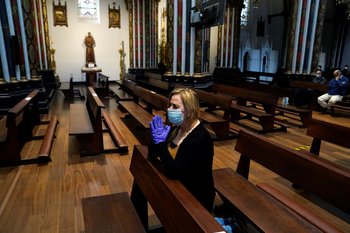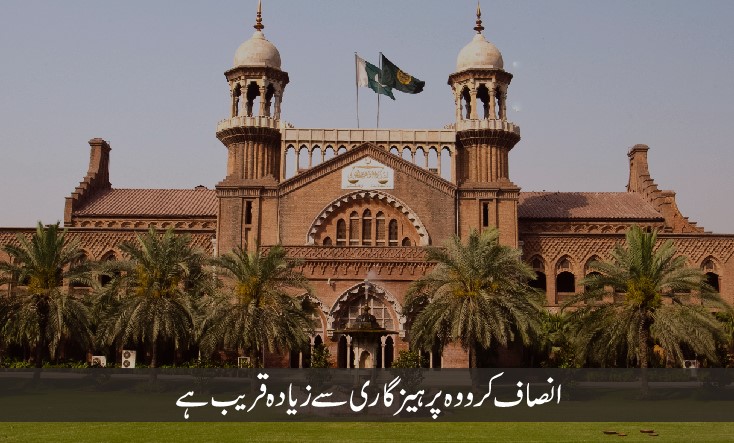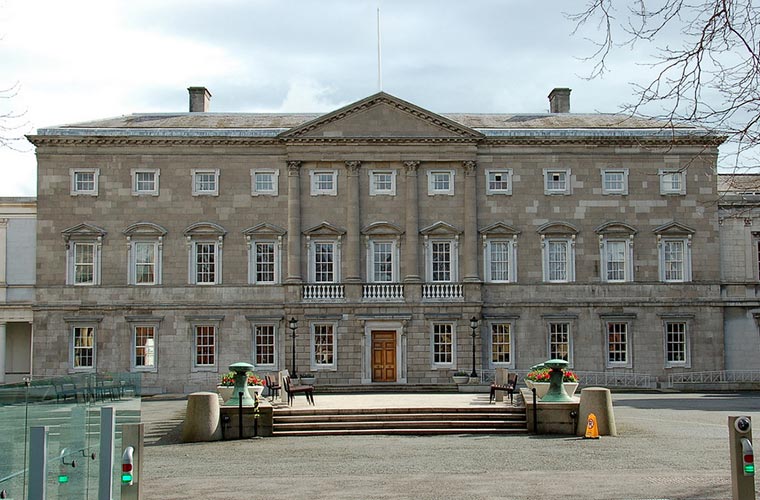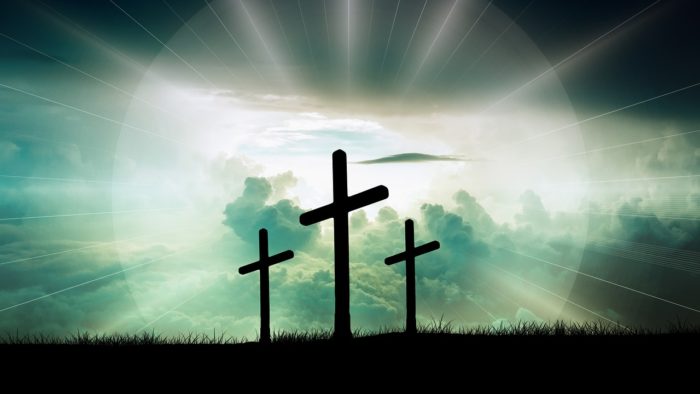
All Churches in Northern Ireland have voluntarily extended restrictions on public worship until March.
The Catholic Primate and Archbishop of Armagh Eamon Martin has advised “on the basis of the clear and unequivocal public health advice that people should continue to stay at home” until March 5th.
Subject to public health advice, he said: “The celebration of the Eucharist and other liturgies should continue to take place without the physical presence of the faithful. Marriage, funeral, baptismal liturgies and drive-in services may continue (subject to strict safety guidelines and regulations).”
It follows a decision by the Northern Ireland Executive last Friday to extend the Covid-19 restrictions until March 5th, he said.
Church of Ireland Primate and Archbishop of Armagh John McDowell said they had also decided that in-person gatherings should remain suspended with the exception of weddings, funerals, as permitted by regulations.
He said that “this same step is also being taken today by the Methodist Church, the Presbyterian Church, and the Roman Catholic Church”.

The majority of the public want to keep the Angelus on air, with most of complaints coming from “secular quarters”, according to the Head of Religious Content at RTÉ.
However, a poll conducted online of more than 31,000 readers by The Journal.ie last week found that 70.3% of people didn’t want the Angelus to be scrapped.
RTÉ’s Roger Childs said polls suggest there isn’t any great public clamour to scrap the Angelus.
He said he is yet to receive a complaint from a member of another faith community; rather, “it tends to come from secular elements of the community who remain a minority, albeit a significant one”.
“The few complaints, and there are very few complaints, seem to come from secular quarters and insofar as they’re ever organised then they’re from lobbies like Atheist Ireland and the Humanists Association of Ireland who see it, perceive it, as a Catholic imposition and an anachronism. Sensitive to those complaints I’ve tried to update the treatment of it on television at least so that it’s more visibly all-inclusive, that it’s for people of all faiths and none.”

US President, Joe Biden has signed an executive order to end “gender-identity” discrimination that mandates allowing male-bodied persons who identify as women access to female-only spaces.
The order says: “Children should be able to learn without worrying about whether they will be denied access to the restroom, the locker room, or school sports”, and, “People should be able to access health care and secure a roof over their heads without being subjected to sex discrimination.”
Ryan T. Anderson of the Ethics and Public Policy Centre said it means: “Boys who identify as girls must be allowed to compete in the girls’ athletic competitions, men who identify as women must be allowed in women-only spaces, health care plans must pay for gender transition procedures, and doctors and hospitals must perform them”.
In reality, he said “it spells the end of girls’ and women’s sports as we know them. And, of course, no child should be told the lie that they’re “trapped in the wrong body,” and adults should not pump them full of puberty-blocking drugs and cross-sex hormones”.
A best-selling author and journalist, Abigail Shrier, commented that, on his first day in office, Joe Biden “unilaterally eviscerates women’s sports”. She said “any educational institution that receives federal funding must admit biologically-male athletes to women’s teams, women’s scholarships”, and she added: “A new glass ceiling was just placed over girls”.

The Church of Ireland has urged parishes throughout the dioceses of Dublin and Glendalough to volunteer suitable churches and parish buildings for use as mass Covid-19 vaccination centres.
In a message to parishes, Archbishop of Dublin Michael Jackson said: “Those responsible for the programme will be looking for suitable venues to administer the vaccine. If you and your select vestry or other governance body decide that the church building or the halls are suitable and safe for this purpose please express your interest.”
St Patrick’s Cathedral in Dublin 8 has offered its services as a mass vaccination centre. Dean William Morton confirmed the offer was made in recent days.
“We are aware that in the surrounding areas of the Liberties and the Coombe, large buildings were in short supply and if the need is there, we would like to help,” he said.
He also acknowledged that the cathedral, currently undergoing major refurbishment of its roof, had received support from the State in recent times.

The Care Quality Commission (CQC) rated the Gender Identity Development Service “inadequate” following an announced inspection in late 2020.
Investigators highlighted long waiting lists and insufficient record-keeping, prompting the CQC to take immediate enforcement action against the Tavistock and Portman NHS Foundation Trust which runs the service.
In the two-year period to April 2020, 85 Irish children and teenagers were referred to the service, according to its website. The psychological services at Children’s Health Ireland (CHI) at Crumlin are provided by the Tavistock clinic and funded by the Treatment Abroad Scheme.
Meanwhile, psychotherapist and author, Stella O’Malley has said the Irish College of General Practitioners (ICGP) have made a mistake on the document they released this week on trans health care as they state that puberty blockers are reversible. She said “the NHS and even the disgraced Tavistock no longer claim this. There will be lawsuits”.
She added that the inaccurate guidance for GPs “will cause real difficulties for young people with gender dysphoria #FirstDoNoHarm”.

Some of the new US President’s policies would advance moral evils and threaten human life and dignity, according to the head of the US Catholic Bishops.
In a statement released Wednesday, Archbishop of Los Angeles, José Gomez, cited concerns regarding family life and the freedom of believers to live according to their consciences.
Instead of more abortion and contraception, he urged Joe Biden to address the factors that are discouraging families and driving women to abort their unborn.
He also called for a family policy that acknowledges the importance of strong marriages and parenting for the well-being of children and the stability of communities.
The statement was criticised by Cardinal Blaise Cupich of Chicago who sent out a tweet calling it “ill-considered”.
Meanwhile, Pope Francis sent a message of hope and goodwill to the new US president. The Pontiff assured Joe Biden of his prayers that God grant him wisdom and strength in the exercise of his office.
He expressed hope that the President might build a society of authentic justice and freedom, with unfailing respect for the rights and dignity of every person, especially the poor, the vulnerable and those who have no voice.
He concluded by willingly invoking upon him, his family and the American people, an abundance of blessings.

Police in Pakistan have dropped an investigation into three men who allegedly kidnapped and abused a 12-year-old Christian girl claiming that she married one of her abductors of her own will.
Farah Shaheen, now 13, spent months in the yard of a 29-year-old Muslim man who allegedly raped her and shackled her by her hands and feet, forcing her to work all day clearing animal dung. She had been taken from the eastern city of Faisalabad in June, and was rescued by police last month.
Investigators have now dropped the charges, however, because, they say Farah testified that she had consented to marry her kidnapper and convert to Islam.
Her case has been taken up by a government committee and by charities that investigate the hundreds of Christian and Hindu girls allegedly kidnapped, trafficked, married off and forced to convert to Islam each year.
A police report suggested she was 16 or 17, but Farah’s birth certificate confirmed her age last June as 12. Her father, Asif Masih, dismissed the police report as “an utter fabrication” and accused officers of having ignored his report of her abduction for months. He told ACN, a Catholic charity, that his daughter was suffering severe mental trauma, and appealed to Imran Khan, the prime minister, for help.

Minister for Children Roderic O’Gorman has said he hopes local authorities will apologise for their roles and lack of action in addressing the abuse in mother and baby homes and county homes.
Meanwhile, Green Party Senator Pauline O’Reilly said she expected Galway County Council to make a “full apology” at its next council meeting on January 25th and to state how it will attempt to make amends for holding meetings in the grounds of the Tuam mother and babies home. Tuam mother and baby home was run in its name and it funded it also.
Ms O’Reilly told the Seanad that “no one can tell me that those politicians did not know of the appalling conditions”.
Speaking during a debate on the report of the Commission of Investigation into mother and baby homes, she said the report shows that the high death rates were known. I expect the same of other councils, particularly Westmeath County Council.”

France’s Catholic bishops have launched a national prayer campaign against government-backed bioethics legislation that would legalise surrogacy and extend abortion, and in vitro fertilization.
The bioethics bill, a flagship commitment by President Emmanuel Macron after his 2017 election, passed in the National Assembly in July and will have its second Senate reading Feb. 2.
It extends the abortion period from 12 to 14 weeks, and in some cases to term, while scrapping an eight-day reflection period and conscientious opt-out right for doctors in France.
Besides extending IVF rights, currently restricted to opposite-sex couples diagnosed with infertility, the measure will also permit surrogacy and authorize “savior siblings,” or embryos created for stem-cell treatment of older children, but the embryos die in the process.
At least a thousand people protested the bill in a Jan. 17 march, with 10,000 taking part via the internet because of Covid restrictions, in what organisers said was a bid supported by most French citizens to “bring a halt to bad policies.”
The bishops’ conference was represented by Archbishop Dominique Lebrun of Rouen at the march. Other church leaders, including Archbishop Celestino Migliore, Vatican nuncio, sent messages of support.

The body of a Catholic priest was discovered in Nigeria on Saturday, a day after he was kidnapped by armed men.
Agenzia Fides reported on Jan. 18 that Fr. John Gbakaan “was allegedly executed with a machete in such a brutal manner that identification was hardly possible.”
The priest of the diocese of Minna, in Nigeria’s Middle Belt, was attacked by unidentified men on the evening of Jan. 15. He was traveling with his younger brother along Lambata-Lapai Road in Niger State following a visit to their mother in Makurdi, Benue State.
Fides reported that the kidnappers at first demanded 30 million naira (around $70,000) for the two brothers’ release, later reducing the figure to five million naira (approximately $12,000).
Local media said that the priest’s body was found tied to a tree on Jan. 16. His vehicle, a Toyota Venza, was also recovered. His brother remains missing.
Following Gbakaan’s murder, Christian leaders called on Nigeria’s federal government to take action to stop attacks on clergy.
The incident is the latest in a series of abductions of clergy in Africa’s most populous country.